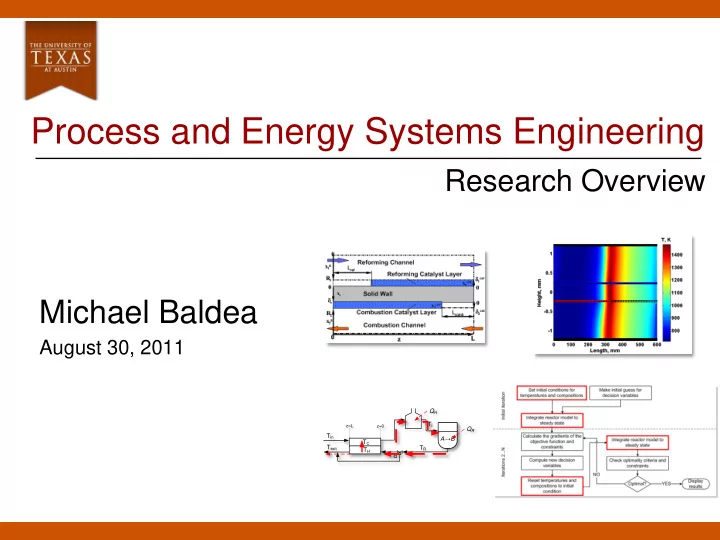

Process and Energy Systems Engineering Research Overview Michael Baldea August 30, 2011 Q H T i z=L z=0 Q R T in A→B T C T exit T R T H α
Systems Engineering Group Michael Baldea “ Babe ş -Bolyai ” University, Cluj -Napoca, Romania • - Diploma (2000), M.Sc.(2001), Chemical Engineering - Model-based control of materials processing University of Minnesota, Twin Cities • - Ph.D., Chemical Engineering (2006) - Emerging dynamics in integrated chemical plants Praxair Technology Center, Buffalo, NY • - R&D Associate (2006-2011) - Energy recovery in cryogenic processes UT ChemE faculty since August 2011 • Currently looking for 2 graduate students Process and Energy Systems Engineering 2
About Our Research SYSTEMS ENGINEERING Theory Applications • • Modeling/model reduction Energy (green buildings, next- Depth generation H2 technology) • Control • Complex engineered systems • Optimization (fault detection and isolation, • Numerical methods, data self-healing process units) analysis Breadth Process and Energy Systems Engineering 3
Green Building Energy Management Buildings consume over 70% of the electricity generated in US Optimal operation: ensure occupant comfort at minimum cost maximize energy recovery, minimize utility load • large-scale problem with discrete (on/off) and continuous decisions • difficult to solve in a practical amount of time • Process and Energy Systems Engineering 4
Green Buildings Research Topics “Plant” Exploit fundamental similarities with integrated chemical • processes to design novel energy management strategies Process and Energy Systems Engineering 5
Green Buildings Research Topics (contd.) Modeling model reduction (novel hybrid systems approach) • fast identification of new models from field data • Proactive energy management strategies Building-level: • optimization-based control • predictive vs. reactive: incorporate weather, cost forecasts • Cooperative energy management (campus-level) • Strategic decision support Long-term economic planning models • optimal capital investment in renewable energy • evaluate energy market opportunities • zero net energy use • Process and Energy Systems Engineering 6
Complex Engineered Systems Integrated SOFC/FP : maximize power density, improve fuel flexibility optimal flow configuration (co- • current/counter-current/cross- current)? H 2 Membrane-assisted reforming: capture – Hydrogen Transport Membrane CO ready CO 2 CH 4 CO Reforming Channel 2 H 2 O CH 4 H 2 O optimal design (e.g., shell-and tube, • Reforming Catalyst Layer plate) and flow configuration (e.g., co- Solid Wall /counter-/cross-current)? Capture- Combustion Catalyst Layer ready CO 2 catalyst distribution and membrane • CH H 2 O 4 Combustion Channel location? Oxygen Transport Membrane Oxygen- depled air Air Process and Energy Systems Engineering 7
Complex Systems Research Topics Fundamental concepts: Modeling : use systems and control ideas to improve numerical properties without altering solution (static equivalence) Optimization : time relaxation-based approach (recent algorithm released commercially) Classes: Systems with multiple (unstable) steady-states Switched systems (IF….THEN….ELSE) Time-periodic/cyclical systems Multi-scale modeling Simultaneous optimal macroscopic system design and material • selection Process and Energy Systems Engineering 8
Fault Detection and Isolation Model-based FDI ˆ x x track residual (system output - reference model output ) • detection: acknowledge occurrence of a fault • isolation: identify specific fault • + T + + T e [r 0] e [r r ] isolated as e 1 easily isolated 1 1 2 1 2 ˆ r = f (x,x) 1 1 ˆ r = 0.001 f (x,x) 2 2 Multi-scale dynamics: potential FDI failure Process and Energy Systems Engineering 9
FDI Research Topics FDI for multiple time scale systems Model-based residual generation • - models of dynamics in each time scale - hierarchical structure: account for time scale multiplicity Sensing • - sensor location to improve fault detection and isolation in integrated chemical processes Actuation • - optimal placement of backup actuators and sensors - actuator switching algorithm Process and Energy Systems Engineering 10
Contact Information Michael Baldea • email: mbaldea@che.utexas.edu • call: 471-1281 • stop by: CPE 4.466 • visit: www.che.utexas.edu > Faculty > Baldea Process and Energy Systems Engineering 11
Recommend
More recommend